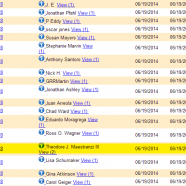
As a content provider who uses the internet to deliver information to my audience, I took the opportunity to comment on the FCC’s proceeding 14-28 or its more common name: Protecting and Promoting the Open Internet. Anyone is allowed to submit a comment on the proceeding, and I suggest you take the time to add your comment to the pile. Below, you will see my entire comment to the FCC. Or you can follow this link: “Theodore’s Comment to the FCC” and read it on the FCC’s website. For the record, anyone who knows me knows already knows this, I am paranoid so realize that both the address and email are fake.
To all residents in the United States of America and the FCC,
Net Neutrality is a vital issue for me as a writer, consumer (purchaser of internet service), but more so as a technology specialist. As a technology expert, I know that the internet has a maximum limit of bandwidth. This means, when two pieces are prioritized, the one with a higher priority will have precedence over the “line”. Thus, a website owner – who can’t afford to pay an ISP for priority – will automatically experience slower times to their website. Why is this an issue? Because, the average wait time for information retrieval is approximately 2 seconds (Nah, 2004). Also, it is important to note that this isn’t just for websites. Nah continues and explains, “According to Miller (1968) continuity of human thought processes is necessary for effective problem solving and a delay of more than 2 s may lead to psychological step-down discontinuities”. It is important to note that a loading bar in a browser can prolonged this two second wait, but frustration begins to set in as time continues (Selvidge, 1999). Those two seconds become a death warrant for a website. The longer you wait for a single website, the more frustration you will feel.
Now an example: if there are two websites (that distribute similar content and one has paid for priority), the one with priority will slowly grow as users abandon the other. Why would people abandon this website? Simple, because it takes too long to load and there are always other options on the internet; they may not be as good, but it’s better than getting frustrated. That two second limit will slowly chip away at a websites user-base until it is all but gone. This will be apparent as Hulu and Netflix continue to compete. As a writer, I use my website to deliver free short stories to my reader. It also acts a place where a user can see status updates on my novels, can read my musings, or can contact me. I pay for this out of pocket, and I run it on my own. I can’t afford a priority lane to my website, and I don’t feel I should have to. Maybe my web host will decide to pay, but that cost will be reflected in my contract when I renew.
Why shouldn’t I pay to have a priority lane? Well, because every user currently on the internet pays for a service that is supposed to provide them with access to the internet. We have no option, you even state this in your proposal and I quote:
“However, the Commission found that most residential customers have only one or two options for wireline broadband Internet access service, increasing the risk of market power, and found the future of mobile Internet access service as a competing substitute remained unclear. Moreover, the Commission emphasized that customers may incur significant costs in switching from one provider to another, thus creating “terminating monopolies” for content providers needing high-speed broadband service to reach end users.” (Page 16, item 42, in Protecting and Promoting the Open Internet)
As the FCC, you even state that there are monopolies when it comes to ISPs (well I should say ISP since we only get one option). That means the consumer, whom you are to protect, is unable to change providers if they want to experience a non-prioritized internet. As an internet subscriber, I expect two things from my internet: 1) it is maintained at the speeds I paid for, and 2) no one manipulates a service I have paid for. Why is two so important? Because I have zero recourse if my ISP chooses that I am not allowed to use the internet for a certain function or to see a certain website. I pay for a service that connects me with a content provider, not a censorship service (that is what will happen when I wait ten seconds for a page to load). You, as a Commission to protect the consumer, should label the internet as a common carrier (Title II of the Communications Act).
Thank you for listening and allowing this open forum.
Sincerely,
Theodore J. Maestranzi III
Anyone else hear that drone?
